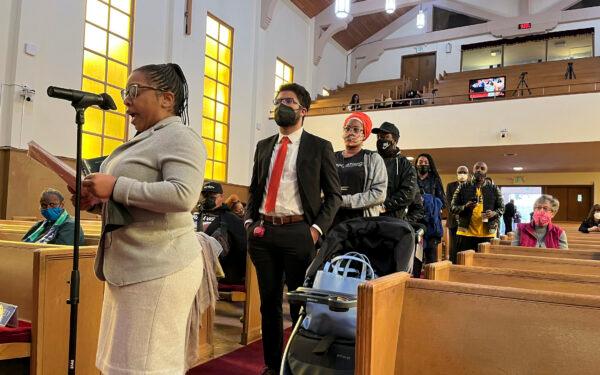A California bill that would set up a genealogy office to determine reparations eligibility has cleared a state Senate committee.
Senate Bill 1403, authored by Sen. Steven Bradford, would establish the California American Freedmen Affairs Agency to help implement policies recommended last year by the state’s reparations task force.
The agency’s genealogy office would oversee eligibility for potential reparations payments and services for descendants of slaves and of free black persons living in the United States before the end of the 19th century.
“This bill is foundational to California’s successful implementation of the Reparations Task Force’s final recommendations,” Mr. Bradford said in the Senate Judiciary Committee’s legislative analysis. “The creation of a state level agency is one of the task force’s key recommendations and essential in administering policies that do not fit into an already existing department or agency.”
He described the measure as an essential element of the task force’s 115 recommendations and said it is vital to the process of overcoming injustices that reduce opportunities and affect the quality of life for descendants of slaves.
“This agency is the first step for California to take actions to right these wrongs that have existed for so long,” Mr. Bradford said during a hearing by the Senate’s Judiciary Committee on April 9. “SB1403 is about demonstrating our state’s commitment to not only recognizing its past but also taking meaningful actions toward an equitable future.”
The senator compared the proposed agency to the Freedmen’s Bureau established in 1865 by the federal government and likened it to the state’s Office of Tribal Affairs.
In closing remarks before the judiciary committee, the author suggested the bill is straightforward and necessary.
“This is a commonsense measure and something that’s long overdue for California and this nation to come to a reckoning of a debt that is owed to people that helped build this country,” Mr. Bradford said. “It’s not charity, it’s not a promise, it’s 160 years overdue, and this will help us ... determine what reparations should look like in California.”
Countering critics who say California was a free state and should not be considering reparations payments, he highlighted the state’s fugitive slave law and historical policies that affected slaves.
“We were a free state in name only, and the first governor of California owned slaves,” Mr. Bradford said during the hearing. “We did everything a slave state did; if you were brought here as a slave, you were treated as such. If you were pregnant and gave birth here as a slave, your child was a slave.”
San Francisco is also considering a reparations package, and the senator said the statewide measure is meant to work in conjunction with other proposals. He also suggested that the federal government should act on the matter.

People line up to speak during a reparations task force meeting at Third Baptist Church in San Francisco on April 13, 2022. (Janie Har/AP Photo)
“While in no way does this bill excuse the federal government or local governments from taking action, California still bears some responsibility,” Mr. Bradford said. “State government committed and permitted grave injustices against African Americans.”
One organization that wrote to the committee in support said the bill prioritizes community engagement and will help manage the complexities involved with reparations discussions.
“Furthermore, the creation of this agency underscores our state’s commitment to confronting its past and working toward a more equitable future,” the Sacramento chapter of the American Redress Coalition of California said in the judiciary committee’s analysis. “It sends a powerful message that we are willing to confront uncomfortable truths and take meaningful action to address the lingering effects of historical injustices.”
The leader of the state’s task force agreed.
“This agency symbolizes a crucial stride toward reparatory justice, particularly for those whose lineage traces back to enslaved ancestors,” Kamilah Moore, chair of the Reparations Task Force, testified in support of the bill during the hearing. “Through rigorous research, the California task force has unveiled harrowing disparities that descendants of slaves still face in California.”
She cited statistics suggesting descendants of slaves suffer from disproportionate health problems and a lower median net worth because of “systemic economic barriers” that have persisted for centuries.
Finding support from the general population could prove difficult, according to a September 2023 Berkeley Intergovernmental Studies poll that showed 59 percent of Californians oppose direct cash payments, though a majority believe the state needs to do more than it has, and 60 percent said the impacts of slavery still affect some Californians.
“While many can empathize with the plight of Black Americans, not all of these feelings will translate into support for policies that address longstanding racial harms,” Christina Morano, co-director of the university’s governmental studies institute, said in the poll’s introduction. “The fact that even liberals are divided indicates that campaigns for racial redress will face a steep uphill climb.”
The bill was passed by the judiciary committee on an 8–1 vote and was scheduled to be analyzed on April 23 by the Senate’s Governmental Organization Committee.












